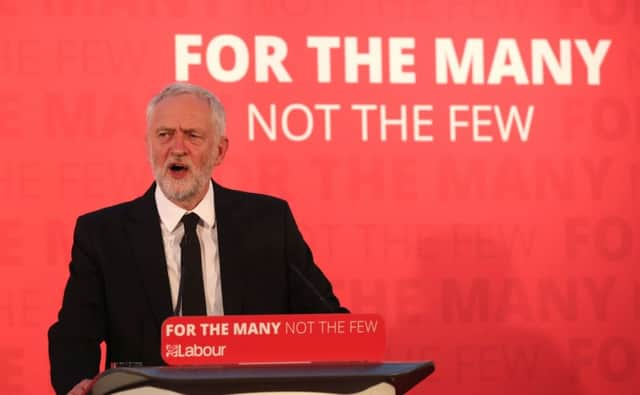Analysis: Is the '˜Corbyn effect' helping Scottish Labour?


It is perhaps a sign of how far Scottish Labour have fallen in recent years that they are cheered by a poll that shows them within ‘touching distance’ of second place.
The party’s decline from its previous hegemonic control of the majority of Scottish seats has been so steep that polls showing them a distant third behind the Conservatives are commonplace.
Advertisement
Hide AdAdvertisement
Hide AdBut now it appears that Labour is gaining ground on the Tories in Scotland – though their focus is fairly relentless on the one seat they hold (Edinburgh South) and a handful of others, they know the importance of vote share in a First-Past-the-Post election.
While the party could come fourth in terms of seats, snatching second from under the nose of the Tories in terms of vote share would be a significant achievement.
But to whom would they achievement belong? Have Scottish Labour gone too far in distancing themselves from Jeremy Corbyn?
Tough on Indyref2, Tough on the causes of Indyref2
Scottish Labour’s campaign, even before the bombshell claim from Nicola Sturgeon that Kezia Dugdale had tacitly withdrawn her opposition to a second independence referendum, was dominated by matters constitutional.
Perhaps it is because that Edinburgh South seat, currently represented by Ian Murray, the party’s sole Scottish MP, is being targeted by the Tories.
Ms Dugdale has tied her campaign back to the First Minister’s record after over a decade of rule at Holyrood.
But the expressed desire for Ms Sturgeon to ‘get back to the day job’ shows that Scottish Labour clearly think there is a benefit for them in opposing the plans for a second referendum.
Jeremy Corbyn has been less stringent on the policy, saying that he would be open to discussions with the Scottish Government should he become Prime Minister after tomorrow’s vote.
Advertisement
Hide AdAdvertisement
Hide AdHe also delighted the Scottish Tories by being quoted as saying that he was ‘absolutely fine’ with a second referendum.
Ms Dugdale would be forgiven for thinking that on the issue that seems to matter most to Scottish Labour, her own leader can’t be trusted to toe the party line.
Mending bridges?
It seems a moot point to consider whether Kezia Dugdale would still rather have Owen Smith facing Theresa May as a potential Prime Minister, not least because without the perceived weakness of Jeremy Corbyn, Mrs May would most likely not have called this election.
The Scottish Labour leader has had two internal elections to back Mr Corbyn, but has vocally opposed him each time.
Little is known about the personal relationship between the two, though Ms Dugdale has hit back at suggestions that she is a late convert to Corbynism, telling the Scotsman last week that she didn’t need convinced of Jeremy Corbyn’s effectiveness as a voice for anti-austerity politics.
It is perhaps worth noting that in two of the Labour leader’s appearances in Scotland, a mass rally in Glasgow last week and a stump speech in the same city this morning, Ms Dugdale has been conspicuously absent.
A cursory glance over the Kezia Dugdale’s official Twitter account shows that tweets using the favoured hashtag of the Corbyn campaign (#forthemany) have been few and far between until the last few days.
Also worth recalling is that Ian Murray is vehemently opposed to the Labour leader, calling for him to resign and leaving the Labour Party without a Shadow Scottish Secretary from a Scottish seat.
To the victor, the spoils
Advertisement
Hide AdAdvertisement
Hide AdMr Murray might not be mentioning Corbyn much on his election literature, but other candidates do have a distinctly Corbynite feel to them.
Rhea Wolfson in Livingston is seen a key Scottish ally of the left-wing leader, and Pam Duncan-Glancy in Glasgow North has also embraced the ‘for the many’ message.
It remains to be seen what kind of vote share the Labour party will get, and with only one or two seats bar the one they hold competitive, the party is still likely to be fourth place by some measures.
The recent surge can’t be quantified fully – though allies of Mr Corbyn are likely to attribute it to the increased support for the party across the UK.
This is worth considering especially when it has been noted that Labour is now ahead of the SNP among voters under 25.
No matter the reasons, the party has seen a boost in Scotland, and it could be claimed that they haven’t done enough North of the border to capitalise on Corbyn’s increased popularity.
Their message, no matter the polling picture in the rest of the UK, has always been relentlessly about the constitution, something Corbyn seems ambivalent about.
It could leave them wondering ‘what if’ come Friday morning.
